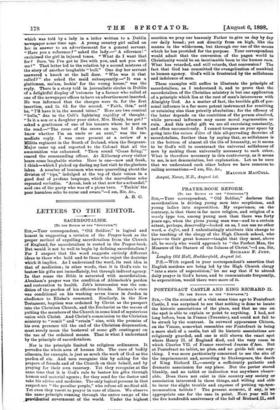LETTERS TO THE EDITOR.
SACERDOTALISM.
[To THE EDITOR OF THE "SPECTATOR."]
Sin,—Your correspondent, "Old Soldier," is logical and honest in suggesting a revision of the Prayer-book as the proper method of expelling sacerdotalism from the Church of England, for sacerdotalism is rooted in the Prayer-book. But would it not be well to begin by defining sacerdotalism ? For I suspect that the word suggests entirely different ideas to those who hold and to those who reject the doctrine which it implies. As I understand the word, its root idea is that of mediation; in other words, that it is God's rule to bestow his gifts not immediately, but through indirect agency. In that sense the Bible is saturated with sacerdotalism. Abraham's prayer was the condition of Abimelech's pardon and restoration to health. Job's intercession was the con- dition of the pardon of his officious friends. Naaman's cure was conditional on his washing seven times in Jordan in obedience to Elisha's command. Similarly, in the New Testament, baptism was ordained by Christ as the passport into the Christian Church, and the Eucharist as the means of putting the members of the Church in some kind of mysterious union with Christ. And Christ's commission to the Christian ministry to "remit" and "retain" sins, with the promise of his own presence till the end of the Christian dispensation, must surely mean the bestowal of some gift contingent on the use of the ordained means. That is what I understand by the principle of sacerdotalism.
Nor is the principle limited to religious ordinances. It pervades the whole area of human life. The cure of bodily ailments, for example, is just as much the work of God as the pardon of sin. And men recognise this by asking for the prayers of friends and of the Church on their behalf, and by praying for their own recovery. Yet they recognise at the same time that it is God's rule to bestow his gifts through human and material agents; for they send for the doctor and take his advice and medicine. The only logical persons in that respect are "the peculiar people," who refuse all medical aid. Yet even they resort to prayer in case of illness. We observe the same principle running through the entire range of the .srovidential government of the world. Under the highest
sanction we pray our heavenly Father to give us day by day our daily bread; yet not directly from on high, like the manna in the wilderness, but through our use of the means which he has provided for the purpose. Your correspondent would admit that the conversion of the pagan world to Christianity would be an inestimable boon to the human race. What has retarded, and still retards, that conversion? The fact that God has committed the evangelisation of mankind to human agency. God's will is frustrated by the selfishnesa and indolence of men.
These examples will suffice to illustrate the principle of sacerdotalism, as I understand it, and to prove that the sacerdotalism of the Christian ministry is but one application of a principle which lies at the root of man's intercourse with Almighty God. As a matter of fact, the terrible gift of per- sonal influence is a far more potent instrument for remitting or retaining sins than priestly absolution; for the efficacy of the latter depends on the contrition of the person absolved, while personal influence may cause moral regeneration or ruin. And this awful gift we are all exercising constantly, and often unconsciously. I cannot trespass on your space by going into the raison d'gtre of this all-pervading doctrine of sacerdotalism, further than by saying that, as selfishness is. at the bottom of almost all the ills of humanity, so it seems to be God's will to counteract the universal selfishness of men by making them universally necessary to each other._ What is therefore necessary in this controversy, as it seems to me, is not denunciation, but explanation. Let us be sure that we understand each other before we have recourse to.


































 Previous page
Previous page